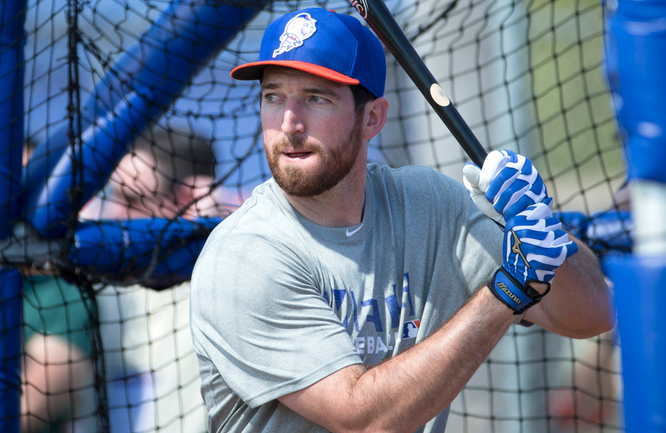
Before the furor grows over the Ike Davis revelation that he played almost the entire season last year with an oblique injury, Met fans should slow down and consider what that fact means relative to Davis’s current standing on the team. I expect Davis will be roundly criticized for not disclosing the injury. In fact, it was not Davis’s intention to disclose his physical limitations at all. He only affirmed the injury when other sources, aware of his physical issue spilled the beans.
Playing hurt is old school baseball, expected baseball behavior of past generations, but something that seems almost alien against modern standards when a toenail can keep a player off the field for a month. As proof of that fact here’s Walter Bingham writing about Mickey Mantle in Sports Illustrated in 1962.
“It was nothing less than a cold and ruthless gamble. Faced with a losing streak and the distasteful prospect of not winning the pennant for a change, the New York Yankees rushed the most valuable property in baseball back into action last week and ran the risk of losing him forever.
Mickey Mantle’s legs had not yet healed, as anyone could see. He limped when he walked and staggered when he swung. He ran stiff-legged and he was unable, or afraid, to make turns. He was not, in short, ready.
The front office denied that it had ordered Mickey’s early return, insisting that Mantle had made the decision himself (and ignoring the fact that most ballplayers—and particularly Mantle—will always insist that they are ready to play, even flat on their backs), but it was undeniable that the Yankee brass had permitted Mantle to play before he had fully recovered. It was a decision made out of desperation.”
Bingham was right then and his words ring true now – most ballplayers of that era, ignoring their physical reality when facing injury, insisted they were ready to play, when in fact they were not. The same egos that helped drive an athlete to commit the time and dedication required of acquiring the skills needed to play a professional sport, often skew reality when evaluating physical limitations when playing hurt. No one challenged Willis Reed’s loyalty to his team when he pulled himself on the basketball court dragging one leg behind him to play in a Game Seven championship game for the New York Mets.
Now, before you have my head, in no way am I implying Ike’s playing through oblique issues matched the heroic former deeds of guys like Mickey Mantle and Willis Reed. I’m simply making the point, a point every high school or youth sports coach inherently understands; when facing a sports injury an athlete will almost always minimize the injury and attempt to play hurt.
Rather than throw ice water on Ike for not being a team player using the fact he played injured as another reason to dump him, stop and take consider what the injury may have meant to his performance last season and to the possibility of a dramatic uptick on the baseball diamond this summer.
In a Sunday column he wrote for the Daily News addressing the Braves signing their homegrown talent to long term contracts, sports columnist Bill Madden makes an interesting point about Atlanta’s willingness to sign an emerging Freddie Freeman to a big money multi year deal. Here’s what Madden says. “The bigger picture here for baseball is the vanishing 25-30 homer hitter and the accompanying law of supply and demand. According to the Elias Sports Bureau, there were only 30 hitters in baseball last year with 25 or more home runs, which was the lowest total since 1992. There were 65 in 2001, the height of the steroids era, and 55 as recently as 2009, three years after baseball began testing for amphetamines.”
Ike Davis is one year, a year we now learn he played with oblique issues, removed from hitting 32 home runs. The news of Davis playing hurt, regardless of how foolish that was on Ike’s part, doesn’t minimize what it means relative to Ike’s potential to hit the long ball.
Rather than add fuel to the fire that the Mets should be racing Ike for the exit doors, Ike’s admission of having played hurt should slow down such conjecture and put caution and reason into play when evaluating his future as a Met.
Was withholding medical information that he was suffering from oblique issues last season an informed smart move for Ike Davis? Of course not. In holding back his physical limitations, Ike seriously limited his playing capacity, thus placing his career in jeopardy. That fact does not minimize the fact that Ike Davis had and still has power potential, an incredibly shrinking asset in the modern game of baseball, something that should not be minimized because Ike let his ego get ahead of his reason and played hurt. In fact, news of Ike’s physical woes, not supplied willingly by Ike as an excuse, could help explain his horrid batting performance making it even more important Met brass slow down and take a wide angled, long-term look at what Ike could mean to the future of the Mets.














